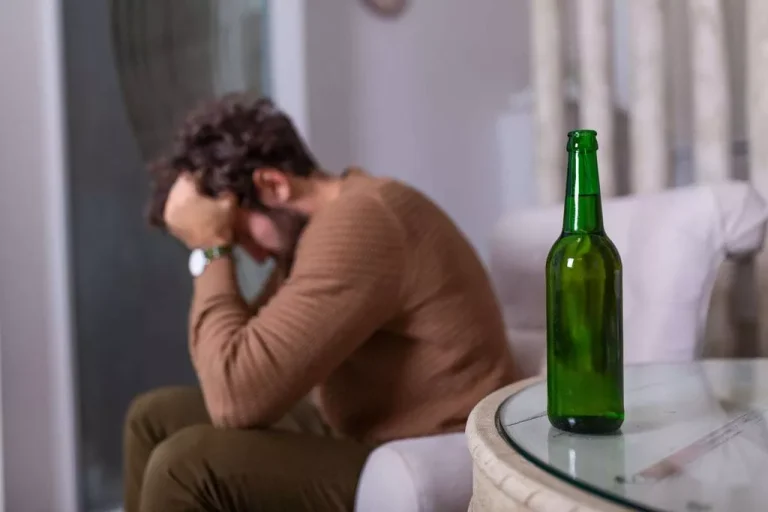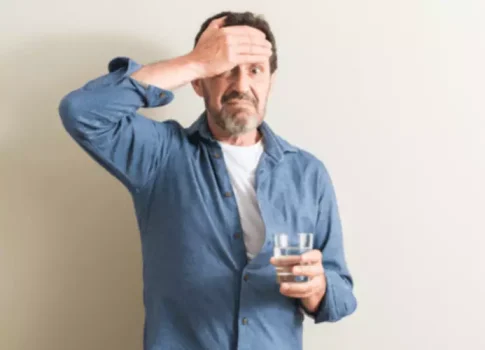
Whether your anxiety is related to past trauma, financial stress, or untreated depression, alcohol is merely a temporary Band-Aid and the longer one depends on alcohol to help treat their anxiety, the more at risk they are for developing an alcohol use disorder. Additionally, symptoms of anxiety will still be lurking around the corner as the underlying triggers have not been properly addressed and treated. The initial symptoms of anxiety and panic may be related to alcohol withdrawal.

Effects of co-occurrence on alcohol treatment outcomes
It also is important to note that reliance on timeframes, although useful, could mask an independent course of anxiety symptoms among individuals who also have an AUD. For example, it is possible that an anxiety disorder which appears at a time when the person is experiencing alcohol-related problems may have an etiology separate from alcohol use. Finally, the assumption that common areas of construct space exist https://ecosoberhouse.com/article/5-great-tips-for-being-sober-around-drinkers/ across the disciplines of psychiatry, psychology, and neuroscience is open to debate. For example, medically oriented researchers might view subclinical negative affect as qualitatively rather than quantitatively distinct from diagnosed anxiety disorders. Similarly, it could be argued that dysregulated biological stress responses share little construct space with subjective negative affect and drinking to cope.
- If you have social anxiety or a social phobia, therapy may work best to reduce your levels of anxiety (combined with a medication such as sertraline, or Zoloft).
- According to a review study that looked at anxiety and alcohol use disorders, this relationship can become a dangerous, self-perpetuating cycle.
- “The more alcohol consumed, the higher chance of experiencing [hangxiety],” he says.
- By Sheryl Ankrom, MS, LCPCSheryl Ankrom is a clinical professional counselor and nationally certified clinical mental health counselor specializing in anxiety disorders.
- A healthcare provider might assess you for anxiety and depression if you have hangxiety frequently.
Treating Addiction To Alcoholism And Anxiety
Self-medicating your panic attacks with drink can leave you psychologically dependent on alcohol because the short-term sedative effects can be addictive. As a shared experience and not a formal diagnosis, there’s no set list of symptoms that define hangxiety. In general, it’s the similar to general symptoms of anxiety, just specific to post-drinking. This is why when you drink alcohol it’s common to feel less anxious and more relaxed. If you consume high amounts of alcohol, the anxiety circuits in your brain become strongly suppressed.
Online Therapy

The term “comorbidity” has become a fairly generic reference for co-occurring alcohol and anxiety or depressive disorders. Yet ontologically, the presence of two or more distinct, clinical diagnoses remains firmly fixed in an increasingly strained can drinking alcohol cause panic attacks medical-diagnostic paradigm of psychopathology classification. Central to this strain is the assumption that specific diagnostic dyads are the appropriate unit of analysis for studying co-occurring negative affect and alcohol misuse.
Can you have alcohol anxiety without having an anxiety disorder?
- But reaching for caffeine may not be the best idea as its stimulant effects could exasperate your feelings of anxiety.
- Among women who are pregnant, up to 14% report currently drinking, according to CDC data.
- Specifically, whereas socially phobic men benefitted equally well from either cognitive–behavioral therapy (CBT) or 12-step facilitation (TSF), women with social phobia fared less well if they were assigned to TSF.
- If you are concerned that you or someone you care about has a problem with alcohol there is a lot of help available.
Seek support if hangxiety keeps you from completing your daily activities. A healthcare provider might assess you for anxiety and depression if you have hangxiety frequently. They might suggest limiting or avoiding alcohol if it causes or worsens anxiety and depression symptoms. Remember to show kindness to yourself if you feel embarrassment, guilt, regret, or shame after a night of drinking. Research has shown that self-compassion helps reduce anxiety and depression symptoms. Try relaxation techniques, such as deep breathing, meditation, yoga, and tai chi.
Why Do You Feel Anxiety After Drinking Alcohol?
Alcohol and Panic Attacks: What’s The Relationship?
- Further, people with anxiety disorders who did not report any drinking to cope drank less daily than people with no anxiety disorder.
- This latter finding suggests that state anxiety that occurs during early abstinence can lead respondents to consider their increased anxiety levels as more chronic than they actually are.
- Research suggests that there is a link between alcohol consumption and anxiety.
Alcohol and panic attacks
- In this situation, a person expects to get relief from their anxiety symptoms when they consume alcohol because of its effect on the central nervous system (CNS).
- Those with AUD may suffer from alcohol withdrawal, which includes physical symptoms of anxiety, such as rapid heartbeat, nausea, and shaking.
- The good news is that there are other, healthier ways to naturally raise CREB levels, such as getting regular exercise and listening to music.
- This study reveals the potential impact of shift work and SWSD on PE and provides new theoretical foundations for the risk assessment and prevention of this condition.
- For example, having either condition should be a risk marker for developing the other.
- This can definitely cause anxiety and worsen any existing phobias or overthinking tendencies you may already have.


